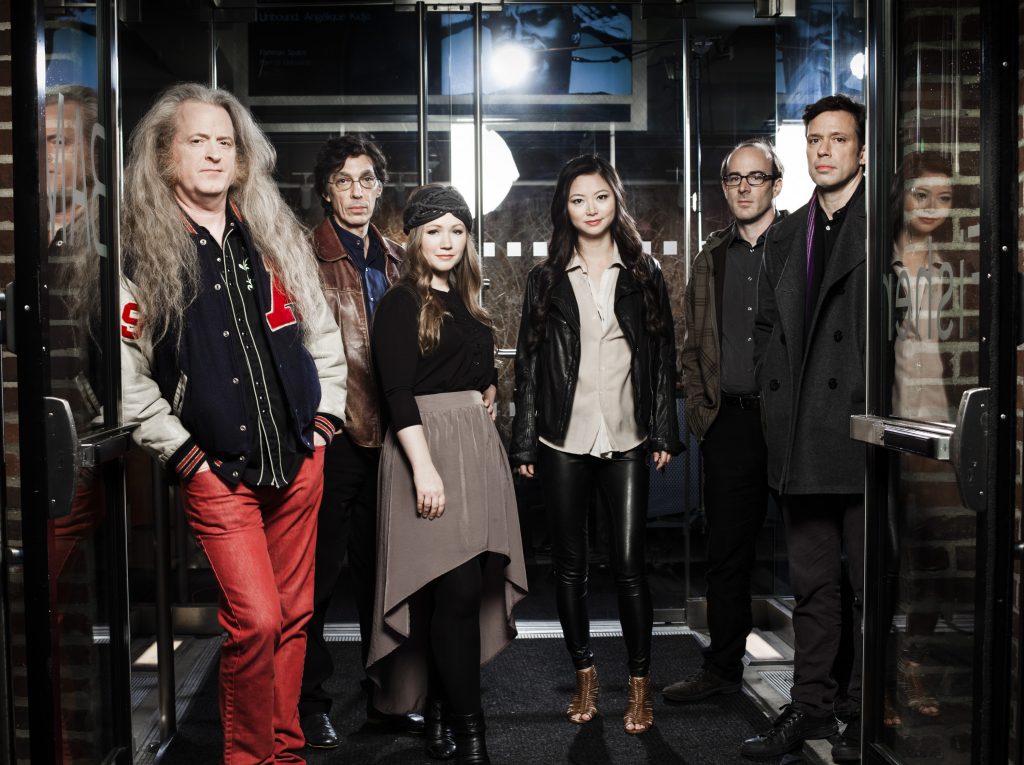Bang on a Can All-Stars ace four premieres in Ecstatic Music anniversary concert

At least three orbits in the new-music universe intersected Tuesday night at Merkin Concert Hall, as New Sounds radio host John Schaefer emceed a concert in Merkin’s Ecstatic Music series featuring the Bang on a Can All-Stars in four world premieres.
The four new pieces — always intriguing and sometimes exhilarating, each lasting about seven minutes — were the latest product of Bang on a Can’s pioneering crowdfunding project, the People’s Commissioning Fund (PCF).
Ecstatic Music is celebrating its tenth year of presenting cross-genre, cross-cultural new compositions by expanding from a few weeks of concerts to a season-long offering of ten events.
And Tuesday’s concert was recorded for future broadcast on Schaefer’s WNYC radio show, “New Sounds,” a lonely but durable outpost of new-music programming since 1982.
Sharing in this celebration of newness at the 449-seat hall was a near-capacity audience notable not only for its size but for its diversity of age, ethnicity, and attire. When Schaefer first stepped onstage, he was greeted with some of the noisiest applause of the night.
But if Schaefer’s ovation was a lifetime-achievement award, the Bang on a Can All-Stars earned theirs on Tuesday with breathtaking virtuosity and stylistic versatility ranging from spiky atonalism to dance-band chic.
The diversity of styles was made possible by that of the instruments onstage, and their capable players: Robert Black, double bass; Vicky Chow, piano and keyboard; David Cossin, percussion; Arlen Hlusko, cello; Mark Stewart, electric guitar; and Ken Thomson, clarinets and saxophone.
Schaefer acknowledged sound designer/engineer Andrew Cotton jokingly as “the fifth Beatle” of the group — an apt comparison, considering the importance of Cotton’s microphones, mixers and prerecorded tracks in producing the concert’s vibrant sound colors and blends.
The four new works constituted the concert’s first half, with Schaefer calling each composer in turn to the stage for a brief chat introducing his or her piece. (Only Hildur Guðnadóttir, caught up in the celebrity whirl of an Oscar nomination for her score to Joker, was absent.)
Asked to express in seven minutes what the idea of dance meant to them, the composers responded with various degrees of abstraction. Qasim Naqvi had been reading about astronomical black holes, and in his piece Featureless he imagined a human form passing through one and breaking down “into a trail of atomic light.” A dark throb in the low instruments, surges of fast eighth notes, a swinging riff in guitar and bass, and clanging temple-bell chords in the piano were some of the elements Naqvi used to imagine the unimaginable in this ear-tickling piece.
Amanda Berlind was more down-to-earth — only not — in her music-video piece Bird Chart. “Birds,” she told Schaefer, “are natural choreographers.” That was evident from her video collage of real-life birds with an Aztec-style bird drawing that hopped about inside the video frame. With the help of cues from clarinetist Thomson, the players synchronized their jumpy groove exactly with the picture’s visual rhythm, to delightful effect.
Guðnadóttir, a cellist as well as composer, subtitled her enigmatic piece Illimani as “a document of the stream of notes in my head while moving.” It must have been a slow-flowing stream, as low-pitched strings and bass clarinet unwound an adagio tune in unison. Later, a steady beat on tom-tom and rattle imparted a ritual flavor, punctuated by isolated notes on piano and guitar.
Alvin Curran’s Missteps bears the subtitle “about 5 of them,” and that is roughly the number of discernible variations the piece generates with its complex recipe of electronic pops and clicks, loon calls, free-jazz cadenzas, and echoes from Curran’s years of playing in “my father’s Bar-Mitzvah Band in Providence, Society Bands up and down the east coast, and show bands in the Catskills and Las Vegas,” as he wrote in a program note. There was never a dull moment in this retro avant-garde affair.
The concert’s second half began with a revival of one of the PCF’s first commissions, Phil Kline’s Exquisite Corpses, named for the parlor game where one player draws a head, then folds the paper and gives it to the next player, who draws a torso, and so on, until the paper is unfolded to reveal the strange composite creature. Without getting too literal about it, Kline imagined a composite of the generations of people who lived in his New York neighborhood (around Henry Street), some famous (George Washington, Zero Mostel) and most not.
Kline’s piece was dancier than most of this year’s “dance” commissions, as a click track (substituting for the boom boxes originally specified) laid down a beat, around which motives gradually gathered like ghosts. A backbeat emerged; Thomson’s clarinet and a recorded xylophone swung with it, until the music dissolved in a whirl of 16th notes for all players.
The virtuoso flourishes of Kline’s piece were multiplied in the late Julius Eastman’s Stay On It, an open-ended piece on a seven-note riff that the composer never wrote down, and whose “original” consists of one audio recording and one video — the latter far longer and more developed. Clarinetist and arranger Ken Thomson told Schaefer that he and co-arranger Ed RosenBerg III had to try to separate improvisation from composition — to ask, in effect, “What is the piece?”
Their answer on Tuesday was an extended affair that did indeed “stay on” its Latin-sounding tune, decorating it with squawking clarinet and wailing guitar trills and players speaking and singing, stretching it an extra beat, surging ecstatically around it, until one thought this should be what going through a black hole sounds like — a Hollywood one, anyway. Oscar jurors, take note.
Ecstatic Music presents keyboardist/composers Missy Mazzoli and Kelly Moran with host John Schaefer 7:30 p.m. Feb. 29 at Merkin Concert Hall. kaufmanmusiccenter.org; 212-501-3330.